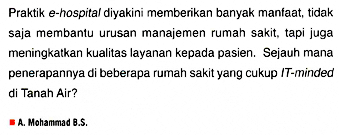This is a translation from selected segments of the e-Hospital article from SWA Sembada Magazine Mar 2007:
 According to statistics, from a total of 1,200 hospitals in Indonesia – 92% are still operating manually when serving patients, while 5% had already implemented computerised systems and only 3% had rolled-out IT in a comprehensive manner.
According to statistics, from a total of 1,200 hospitals in Indonesia – 92% are still operating manually when serving patients, while 5% had already implemented computerised systems and only 3% had rolled-out IT in a comprehensive manner.
Based on SWA observations, the use of IT is indispensable in various departmental operations in premier hospitals in Jakarta. Some of it has already reached a different level i.e. full integration. Thus, they can confidently claim that they’ve already implement a Total e-Hospital System.
 For example Mr. Tavri Deviyan, Chief Information Officer (CIO) of RS Pondok Indah (RSPI) recollects that IT Management Systems were introduced in RSPI in 2003. To support the initiatives, RSPI implemented VESALIUS – the software designed and developed by a public-listed company from Malaysia, Nova MSC Bhd. and Oracle Finance.
For example Mr. Tavri Deviyan, Chief Information Officer (CIO) of RS Pondok Indah (RSPI) recollects that IT Management Systems were introduced in RSPI in 2003. To support the initiatives, RSPI implemented VESALIUS – the software designed and developed by a public-listed company from Malaysia, Nova MSC Bhd. and Oracle Finance.
The VESALIUS application has two core modules, Hospital Information System (HIS) and Clinical Information System (CIS). The HIS module has the ability to automate all back office and administrative process, including the finance application module. The HIS module include patient and doctor administration, roster & appointment, registration, pharmacy, billing system, cashier, purchasing, inventory, medical record tracking, lab and radiology information system and meal order. CIS is the module that covers all the clinical processes, for both inpatient and outpatient environments. The module also covers e-prescription, which allows the doctor to prescribe medicine for the patient via the computer. The CIS modules include Outpatient Clinical Management (Order Management, Electronic Medical Records [EMR], Prescription and Medical Alerts), and also Inpatient Clinical Management.
All the above-mentioned modules, as described by Mr Deviyan, are centralised and integrated with the EMR – all patient medical records that have been computerised. Ideally, all modules must be integrated so that efficiency and productivity is optimised. However, he says, that some modules like EMR, Lab and Radiology Information System has not been implemented yet.

“To achieve a complete e-hospital will need time. In our first phase and milestone, we implemented the basic functions – starting from the patient registration, purchasing, inventory, and pharmacy. These core functions must be there first,” said Mr Deviyan.
Apart from VESALIUS, RSPI had also implemented PB Views. This application is employed to view and analyse the hospital performance from the management and financial point of view. With the implementation of PB View, RSPI is the first hospital in Indonesia to advance the concept of Balance Scorecard within the healthcare industry.
Apart from those two applications, RSPI also utilised Short Messages Services (SMS) as of December 2006, this function not only serve as a patient reminder, it works as well for registration. For example, to remind the patient, especially the executive one, regarding their time for medical check up; as media information for any promotion regarding new services or any activity conducted by RSPI such as health seminar, etc.
According to Mr Deviyan, RSPI sends up to 500 SMS weekly, mainly to their executive members. In future, the SMS service will be extended to consultation appointments.
Mr Deviyan also explains that the late implementation of EMR and e-Prescription is due to change management required within the hospital – mainly from nurses and senior doctors. However, as planned, the entire IT project will be commissioned by this year, including the self-registration, through Self-Service Kiosks. Through these kiosks that resemble ATM machines, patients need not register at the admissions department, but can do so themselves, as all patients are issued with patient cards. The process is likened to an ATM transaction. Once the patient card is inserted, relevant data about patient will appear on the screen. From the touch-screen panel, patient can select options available.
“When all these have been implemented, we can then proudly announce that RSPI is the hospital that is fully digital or fully paperless” said Mr Deviyan enthusiastically.
For the full article, please click here.
Comments are closed.

